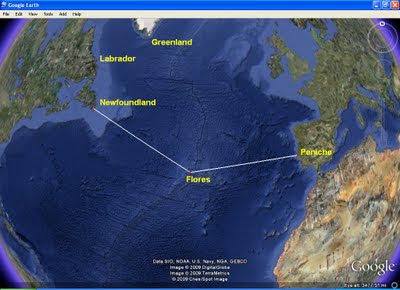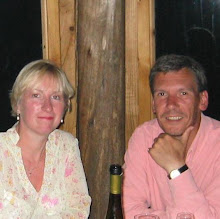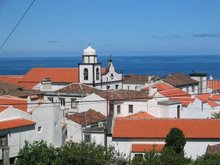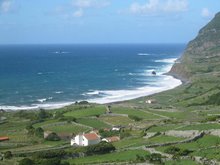Time has to be found to Google Earth the nearest villages to Faja Grande in Europe (bar Madeira and the Canaries) and North America - a dirty job someone has to do considering FG flatters itself as the west-most village in Europe (if you don't count anywhere in Greenland or the French departements outre mer - Guadeloupe and Martinique - in the Caribbean).
 Anyway, at No. 1, the nearest mainland settlement to here is a place called Peniche on the west coast of Portugal about 40 miles (65km) north of Lisbon. It's 1,160 miles (1,870km) from Flores.
Anyway, at No. 1, the nearest mainland settlement to here is a place called Peniche on the west coast of Portugal about 40 miles (65km) north of Lisbon. It's 1,160 miles (1,870km) from Flores.
 At No. 2, only 40 miles further from here than Peniche in the other direction, is a village rejoicing under the name of Renews-Cappahayden in Newfoundland, Canada, 1,200 miles (1,930km) away. It reminds me a lot of Lochmaddy in North Uist in the Outer Hebrides of Scotland:-
At No. 2, only 40 miles further from here than Peniche in the other direction, is a village rejoicing under the name of Renews-Cappahayden in Newfoundland, Canada, 1,200 miles (1,930km) away. It reminds me a lot of Lochmaddy in North Uist in the Outer Hebrides of Scotland:-
 But Newfoundland is an island so, at No. 3, the nearest village on the continent of North America, 1,465 miles (2,360km) away, is St. Lewis (previously known as Fox Harbour) in Labrador, Canada and officially recognised as the eastmost permanent settlement in mainland America.
But Newfoundland is an island so, at No. 3, the nearest village on the continent of North America, 1,465 miles (2,360km) away, is St. Lewis (previously known as Fox Harbour) in Labrador, Canada and officially recognised as the eastmost permanent settlement in mainland America.
* the British Isles - Skellig Michael, an island off the SW coast of Ireland - 1,310 miles (2,110km) - further away than Newfoundland.
* the UK - the Isles of Scilly off the west coast of Cornwall, England - 1,410 miles (2,270km) - closer than Labrador.
* Scotland - the Mull of Kintyre (as in Paul McCartney) - 1,600 miles (2,580km) - a stone's throw from Campbeltown.
 You're mocking now but you'll thank me next time you're attempting to break a ballooning record and you look round and find Richard Branson slumped over the controls.
You're mocking now but you'll thank me next time you're attempting to break a ballooning record and you look round and find Richard Branson slumped over the controls.





1 comment:
The map makes apparent why 19th-century New Bedfor (Massachusetts) whaling ships carrying just skeleton crews historically made their first stop along the west coast of Flores, in order to pick up the rest of their complement from among the locals (knowledgeable re the sea, presumably willing to work for less, and desirous of avoiding Portuguese military conscription).
Post a Comment